- Home
- Claire North
The Pursuit of William Abbey Page 7
The Pursuit of William Abbey Read online
Page 7
Chapter 15
I know that they put me on the back of a horse, slung like an old blanket across its rump.
I do not remember the experience, but I woke with the certain knowledge that this was what they had done.
The Boers travelled fast. Their speed on horseback was one of many ways in which they beat the British.
I woke for a little while, and blathered the truths of men’s hearts.
Then I slept again.
When I woke, it was in a white room with a crucifix on the wall, and the compulsion to speak was gone.
I was in a room behind a church. The church was timber and dirt. The priest, Vinke, had come to his calling when he was eight years old. Peeping through the cracks in the wall one insect-chittering night in summer, he had caught the slightest glimpse of his mother, naked, reaching out to his father, who took her in his arms and…
Well, there Vinke had looked away, but from that day forth the fire of the sermons in the church had beaten against his conscience, and though he had finally had sexual experiences aged twenty-six and come to reassess quite how he viewed his parents’ depravity in the light of older age, that early commitment to the gospel of purity had left far too deep a mark upon him to ever be scrubbed away.
All this I knew, but felt no compulsion to say it.
“We worried we would lose you,” he mused, sitting by the side of my bed. “For a while they thought you were dead.”
“Where is this?”
“We are outside Bloemfontein. You are English?”
“Yes.”
“I think you are lost.”
I looked at this man, square face on square shoulders, square beard cut beneath square greying hair; nose like a castle buttress, hands you could lose a football in, made soft with the touch of sacred things, and I knew the truth of his heart.
And in that moment, finally, I knew I was not mad.
I was not mad.
“I need to leave,” I said. “I need to keep moving, before it’s too late.”
“You’ve been very ill. You’ve suffered from the sun, from—”
“I have to move.”
“It’s not as simple as—”
“Have you spoken to the sangomas? Do you know about the magic they do?”
Vinke’s lips thinned. He knows that the sangomas are charlatans and heathens. He also knows that he came with the word of Jesus, but these charlatans and heathens have, thus far, proven too much even for the Lord. He doesn’t know what this means, and assumes that his failure is a result of his sin, and fears in the deepest, most secret part of his heart that it is not.
When he hesitated, I said all of this out loud, rasping out the truth of his heart as he sat in prey-frozen stillness.
The truth can be a wonderful motivator. They put me on the back of the post wagon to Durban that night, shoved between boxes of letters and freshly harvested asparagus. The driver of my vehicle was Ndebele, and partially deaf; he wouldn’t mind my talking, they said.
A horse and wagon weaving through the hills of Natal does not travel significantly faster than the shadow of a boy. We stick to the road; he travels in straight lines, and though he is slow, he does not rest. Plot the course that we take to Durban, and you will find him constantly adjusting his route to edge a little nearer, a little nearer.
The post, however, was a sacred sign of civilisation, and the driver pushed his horses hard, sleeping only four hours when we rested and bullying me in a mixture of Afrikaans and isiNdebele to watch the road as he slumbered for twenty minutes at a time during the day. His name was Zenzo, and in the five and a half days it took us to reach Pietermaritzburg, I came to love him. The compulsion to speak the truth faded a little at the end of the first day, but never in that time was I free of the knowledge of his heart, and as the time rolled out across the rising hills of the Drakensberg, I sat and silently communed with the essence of his soul.
By the time we crested the forest road that led down to the sea, I could feel the touch of his wife’s hand in mine as she died for the stillborn child; I tasted the salt in his mouth, felt the beating of his heart when roused to anger, the laughter he secretly shared at childish things. I knew that he respected his boss, who was fair where others were merely tyrants, and loathed many of his colleagues on the old post road, who he considered vulgar, lazy and crude. He feared the railway that was gnawing one iron bar at a time from Cape Colony to Pietermaritzburg, knew that when the first train came his world would end; and hated crossing the Transvaal, where neither white nor black men would look at him, as if the pride of the Boers had infected their beaten servants too, who learnt to look on other black men as though to say “See this poverty I have? It is a better poverty than yours.”
He had no interest in me. Strays often hitched a ride on his wagon, and the Boers had been eager to see me gone, paid a little extra for the service.
When I left him in Durban, I wished I spoke his language to express how grateful I was for the size of the heart that beat within him, but didn’t know how to say it, so held his hand and hoped he understood what I meant, and knew he didn’t as he trotted away.
Durban gave me a little respite, a day at most; but the shadow was coming, and though I could keep my lips sealed, I could not help but see the truth of everyone I passed as I struggled my way to the docks.
Chapter 16
I had no money, no way of buying passage out of Africa. I had one set of clothes, which I had worn since I left Baker, a week’s worth of travel between Bloemfontein and the sea on my face and in my fingers, no medical supplies and nothing to barter except my skills. I approached eleven captains in the port, and all but one laughed in my face.
“A medical man,” mused the last. “Well, yes, sometimes they’re useful.”
But in his heart he was wondering what kind of debt I might be in, and whether that debt made me desperate, malleable. I thought of committing myself to him anyway, just to escape these shores before Langa came; but I could not trust his soul, so I repented and went looking for help elsewhere.
I went to government offices, and they had no time for me. They told me to go to the poorhouse or the chapel. So I went to the priest, feeling with every word that fell from my lips the urge to speak truth coming a little nearer as Langa approached, struggling to hold back the words that grew within my belly. And one man gave me broth, and another man gave me a cup of small ale, and a third suggested a place where the vagrants slept, and none could give me a way to escape my shadow.
I had no money to telegram my father for help, and wasn’t sure he’d care even if I did.
I sat on the edge of the Indian Ocean and wondered if I should fill my pockets with stones and walk into it, and laughed at how sandy and warm the beach was beneath my fingers, and how you could never find good English shingle when you needed it.
In the end, I tried picking the pocket of a man dressed for a first-class voyage to a first-class destination, and failed, and was caught instantly, beaten around the ears and thrown into gaol.
I sometimes wish I had faith.
I have known what it is to believe, for a little while. A guru in India who knew without a doubt that the cycle was ending. A rabbi who felt the spirit move through him. A medium in Yangshi who cut herself so that the spirits might enter; a miner in Argentina who heard the voice of Jesus in the stones themselves. I have known revelation in the call to prayers, and felt the presence of all manner of higher powers in the dancing of the incense, but it has never been my truth. Never been my conviction. Only when the shadow is close do I know what it is to have divinity in your heart.
And also, I have sat with the mother whose child is dying from influenza, and watched the girl’s lips turn blue.
Talked with lovers betrayed for a whim.
Sat with soldiers in the ruins of war, seen the places where the Communards fell in Paris, the soldiers marching forward in a stiff straight line, and known with a ringing in my heart: there is no God.
All these things I have known as absolutely as I know the sun will rise.
And then the shadow passes, and I know nothing any more. Conviction fades, and I’m left behind, wondering what I believe, when everyone else is gone.
In the cells in Durban, twenty to a stinking room, beaten and with the truth flowing freely now from my lips, I knew the heart of every thief, beggar, killer and broken man pushed within the prison walls, and knew nothing of myself, save that I had failed.
In the night, the shadow came. It stretched out its broken arm as I screamed and clawed at stone, and one man hit me, smashed my head into the wall to keep me quiet, and that still wasn’t enough, and Langa reached into my soul with blackened hands, and all was darkness.
Chapter 17
The second person the shadow killed was Huw Plender. My old university friend, who I had shared lodgings with and who had given me the gift of friendship, and the somewhat more dubious gift of a taste for strong drink and pretty women. When I had decided that I loved Isabella above all other women, he had proclaimed, “Well, better to do this while you’re young, and have time to get over it.”
He was my colleague, my friend, a devastatingly fast surgeon, a somewhat unethical doctor.
On 29 December 1884, he dropped dead mid-sentence on ward round in Whitechapel, and the four people who stood by swore that something black crawled from his body, a living, reaching creature that vanished into the gloom.
I never knew where his mother lived, and never found the words I would say to her, had I really tried to make amends.
Chapter 18
I came before the magistrate, who lamented at seeing a medical man brought low, and was minded to give me a second chance. Thus my sentence was only thirty days’ imprisonment, and a fine, to be paid as soon as I had secured proper medical employment.
I took all this in silence. I had no more words to say. I didn’t know who the shadow had killed, and wasn’t to find out that it was Plender until nearly two years later. I assumed that it had killed Isabella, the woman for whom I had been flung to the far side of the world. I resolved to find some means to have myself murdered by the inmates of the prison, as soon as I was able, and thus spare the life of anyone else I loved.
Fate, however, had another hand to play.
Kalberloh was tall as a pike, broad as a barrel. Like the Boers, he had taken to wearing clothes indistinguishable from the pale dust through which he galloped, with thick skin trousers and boots up his calves, scuffed at toe and heel. He wore a pistol on his hip, a hat on his faded sandy hair, and sported a beard that starlings could have nested in. He spoke Dutch, German, English, French, Portuguese, isiZulu, isiXhosa and a smattering of Cantonese. People took him for an idiot, for when he did speak, it was slowly, each word as precise as a bullet fired into a crowd, seeking just one target. Then they listened for a while, and changed their minds.
He met me at the prison gate. No one said why I was being released. They just picked me up, walked me to the door, pushed me into the grey dawn light and slammed the gate behind me. The dawn chorus of Durban was a shrieking, hooting affair. The morning birds, feathers of blood red and sapphire blue, emerald eyes and plumes of saffron, looked spectacular, but the noises from their throats were as ugly as a rutting fox.
Kalberloh came up to me and said, “Dr William Abbey?”
“Who are you?”
“My name is Kalberloh. I have been sent to take you to the hotel.”
“What hotel? What? Sent by whom? Who are you?” Questions passed my lips faster than I could reason, creating a tumble of confusion.
He put one steak-slab hand on my shoulder, gently, and replied, “Would you like some breakfast?”
The hotel was by the sea, a new establishment of high white walls and ornate metal balconies. I sat in the breakfast room and was served toast and jam, apricots and figs, papaya, Indian tea and slices of cold meat, and had no idea what was going on. The place in my soul where the truth had been as the shadow came was now a deafening silence, and for a moment I almost missed my madness, the malady of certainty that had afflicted me since Baker. Kalberloh read the newspaper while I ate, then invited me to join him for a constitutional. This involved walking down the pinkish-grey sands of the beach to the warm, lapping edge of the sea, where he stripped off into a bathing suit that hooked over his shoulders and clung to his thighs, leaving a hollow U shape across his back and hairy chest, before running into the waves. I took off my socks and shoes, not knowing what else I should do, and paddled lamely on the shore as he proceeded to breaststroke up and down like a frog hunting its mate.
When he was done, he shuffled back to shore, emerging from the depths like the Ancient Mariner. Lying back in the now high, blistering sun, he crinkled his eyes in the first signs of delight I had seen, and exclaimed, “I love the sea!”
I sat awkwardly next to him, silent now, having given up on getting anything from him before he was ready to speak.
This meek quiet was perhaps the invitation he was waiting for, having broken me to his way of things through toast and exercise. He sat up a little on his elbows, and looking out over the curving, gentle ocean asked, “Have you spoken to the sangomas?”
“What? I… No. Yes. A couple.”
“What did they say?”
Mouth hanging open, I stared at this strange man, looking, hoping for anything else from him, some sign of his intent. He just sat there, sandy, salty, waiting. I closed my mouth, looked at my bare feet, at the whitewashed summer sky, and said, “They say I’m cursed.”
“Do you believe them?”
“Yes. I do.”
To my surprise, he smiled, and patted me on the back. “You are absolutely correct, Dr Abbey. It is marvellous.”
He sprang back to his feet as if propelled by a catapult, slung his jacket over one arm and his shoes round his neck, and gave his fiercest battle cry: “Now we drink iced beverages and celebrate!”
The next hour was a sun-soaked blur. Now we walked, now we sat beneath the pale green shade of the palm tree. Now we drank strange concoctions of crushed ice and stirred fruit that cost more than I earned in a week; now we strode on triumphantly. “Of course there have been many like you,” he exclaimed brightly, the floodgates of his speech opened by invigoration. “My employers have studied numerous primitive peoples for this purpose. We think the Russians have one, and maybe the Ottoman sultan, but the rumours come, rumours go. There’s definitely one in Hunan, but she keeps on moving. Of course you people keep on moving, of course. I was sent to find sangomas with the condition, thought there might be one up at Angra Pequena but then the German gunboats came and I had to turn back, frustrating! Then you! An Englishman, no less. You should have contacted us in Kimberley. We could have saved you a great difficulty.”
“Who are we? Who are you?”
He looked up from his contemplation of iced beverages and tales half told, and smiled. “Dr Abbey,” he replied, “is it not obvious? I am a spy.”
I do not know the truth of Kalberloh’s soul. Like most of my masters, he went to some efforts to ensure I never would. On the one hand, he is trusted by the Xhosa of the southern Cape, who call him brother, friend, and have shown him how to honour the dead, and the old drumming dances for healing and for war; and he says that they can find divinity in the stars and the wind, in the water and in the earth, and that justice spoken in quiet counsel between all men – though never the women – is wiser than our arbitrary scribbled laws.
And then again, when the Nineteen say “go find us a sangoma”, out he rides into the veld, and kills any man, British, Boer or Bantu, who stands in his way without a thought, for he has a job to do and is good at doing it, and back to Cape Colony he drags the screaming sangoma with a rope around her neck, knowing what fate awaits her at the truth station, and caring not a jot. Lo, he deposits his charge; lo, he rides away; lo, he returns to the Xhosa that he calls brother, sister, lover, friend.
Of all men, I wish I had met him with the shadow at my back, and known the truth of his heart.
Instead, I tumbled into his grasp that day in Durban, too numb and dumb to think.
Chapter 19
He gave me a night to think about it.
A night was never to be long enough, and at the time I was grateful. The Nineteen are supremely skilled at making you grateful for your cages.
He paid for my hotel room, fresh new clothes, food, drink.
He had me followed, though I didn’t know it then, by a Malay of questionable character, as I prowled along the shore of the ocean.
He never threatened me. He never said, “We lock you up and let the shadow come until everyone you love is dead.”
He simply looked at me when I asked, “What if I say no?” and shrugged and replied, “It’s your road.”
Just me and my shadow, walking together. I sat by the sea as the moon rose against a southern sky, and had no idea how to find Polaris, and not a penny in my pocket, and wondered for a moment where he was now, the boy who had burnt at the boab tree. I thought of finding a sangoma, of falling at their feet and begging, begging, look how repentant I am, look how far I’ve come, set me free, please, set me free. I wondered if Langa was truly dead, or if some part of his soul was enslaved to his shadow, yearning to be free. The sea washed at my feet, salted the rolled-up hems of my trousers.
In the years to come, I’d find a woman who knew the secret ways of the thing, and like Mbalenhle she would shake her head at my story, and tut, and eventually say, “She that cursed you – she has my love.”
She had never met Sibongile, of course. Nor did she need to. A mother’s love for a child carries on unchanged, no matter how long the road is.

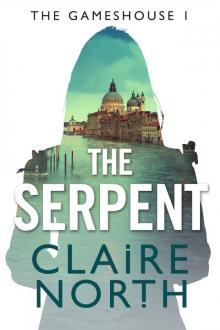 Gamehouse 01 - The Serpent
Gamehouse 01 - The Serpent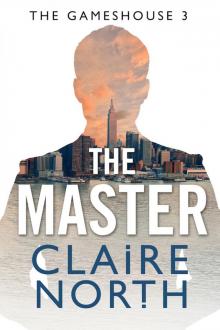 The Master
The Master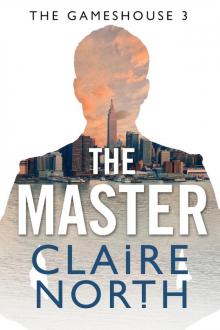 Gamehouse 03 - The Master
Gamehouse 03 - The Master The Thief
The Thief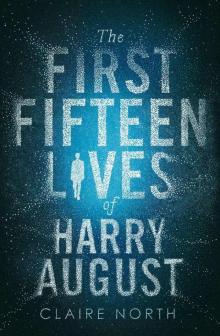 The First Fifteen Lives of Harry August
The First Fifteen Lives of Harry August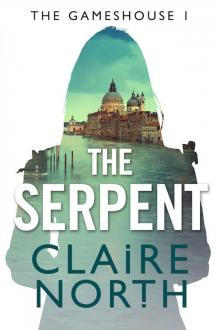 The Serpent
The Serpent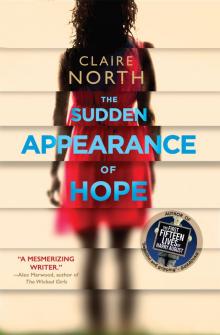 The Sudden Appearance of Hope
The Sudden Appearance of Hope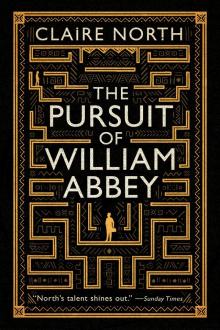 The Pursuit of William Abbey
The Pursuit of William Abbey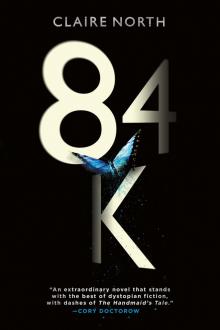 84k
84k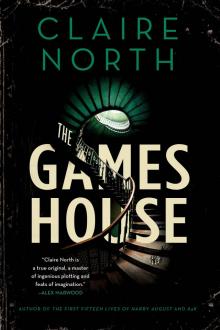 The Gameshouse
The Gameshouse Touch
Touch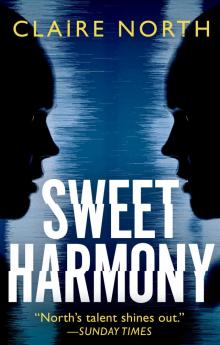 Sweet Harmony
Sweet Harmony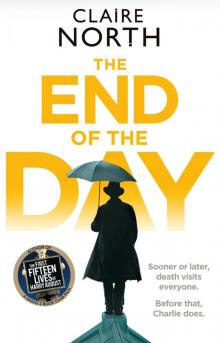 The End of the Day
The End of the Day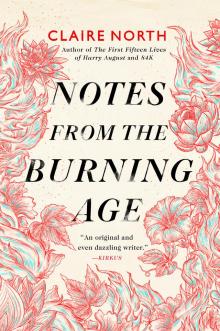 Notes from the Burning Age
Notes from the Burning Age